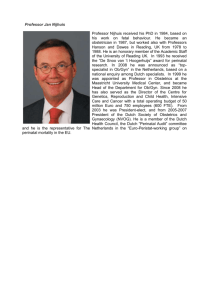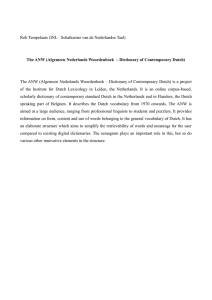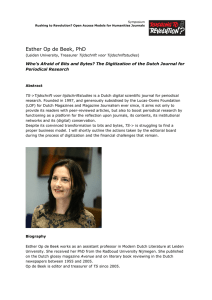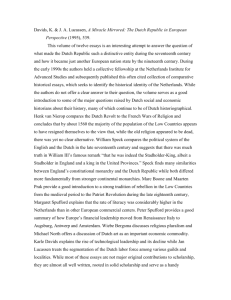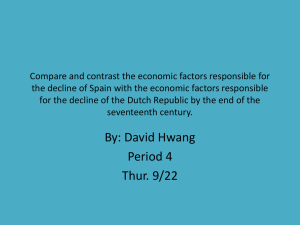English Expressions using different countries` names English
advertisement
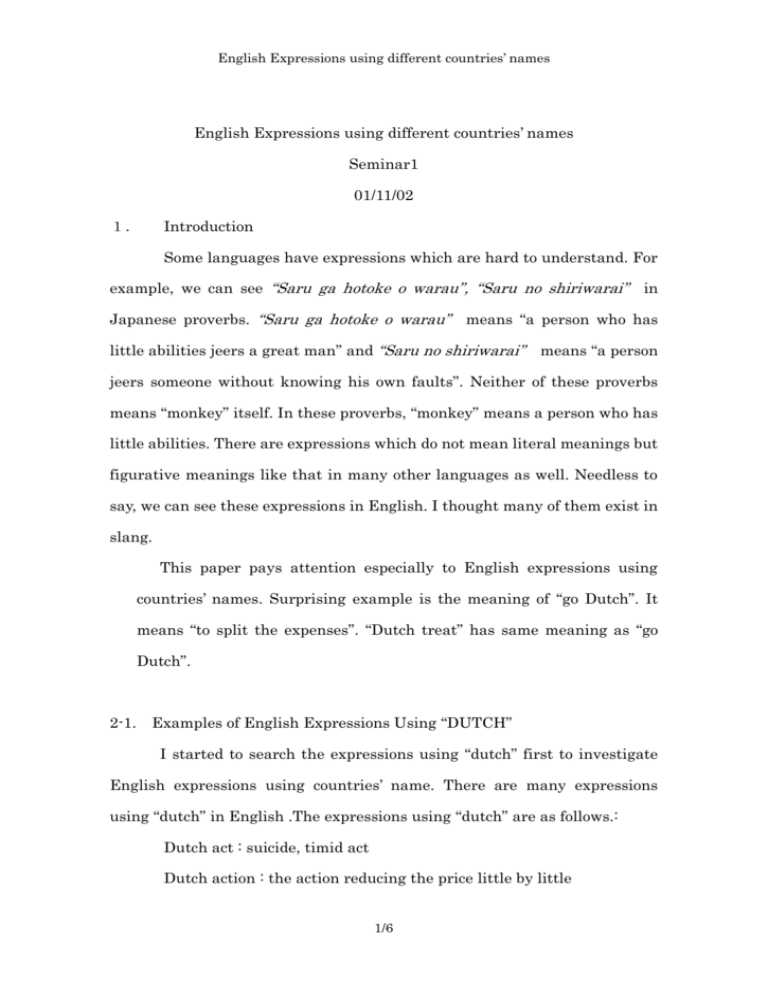
English Expressions using different countries’ names English Expressions using different countries’ names Seminar1 01/11/02 Introduction 1. Some languages have expressions which are hard to understand. For example, we can see “Saru ga hotoke o warau”, “Saru no shiriwarai” in Japanese proverbs. “Saru ga hotoke o warau” means “a person who has little abilities jeers a great man” and “Saru no shiriwarai” means “a person jeers someone without knowing his own faults”. Neither of these proverbs means “monkey” itself. In these proverbs, “monkey” means a person who has little abilities. There are expressions which do not mean literal meanings but figurative meanings like that in many other languages as well. Needless to say, we can see these expressions in English. I thought many of them exist in slang. This paper pays attention especially to English expressions using countries’ names. Surprising example is the meaning of “go Dutch”. It means “to split the expenses”. “Dutch treat” has same meaning as “go Dutch”. 2-1. Examples of English Expressions Using “DUTCH” I started to search the expressions using “dutch” first to investigate English expressions using countries’ name. There are many expressions using “dutch” in English .The expressions using “dutch” are as follows.: Dutch act : suicide, timid act Dutch action : the action reducing the price little by little 1/6 English Expressions using different countries’ names Dutch bargain : sales contract with drinking Dutch comfort : the comfort which is not welcome at all Dutch courage : being brave after having too many alcoholic drinks Dutch gold (metal, foil, leaf) : cheap fake gold foil Dutch talent : the act using power but brains Dutch teast, Dutch concert : the racket without formalities Dutch uncle : a person who is stern and critical when giving advice to others talk (to) like a Dutch uncle : give a person a scolding strictly Dutch window : prostitute Go Dutch, Dutch treat : to sprit the expenses beat the Dutch : doing something like astonishing the people “I’m a Dutchman!” : I may risk my head. son of Dutch : son of a bitch to be in Dutch : being in trouble We can find that expressions using “dutch” have not so good meaning by these expressions. According to circumstances, they include sarcastic and discriminatory meanings. 2-2. The Reasons Why The Expressions Using “DUTCH“ Have Bad Meanings Why do the expressions using “dutch” have such meanings? Two reasons may exist with it. ・ The Dutch are truly stingy, stern and unsociability. ・ The English hate the Dutch greatly. 2/6 English Expressions using different countries’ names First, I searched if the Dutch are truly stingy, stern and unsociability. Rodney Bolt (1999) says that “It is virtue for the Dutch to save money, but it is vice to spend money”. We can find that the Dutch value money from this line, but it cannot necessarily say the Dutch are truly stingy. He also says that “The Dutch do not deny up to worldly pleasures”. I found that the Dutch have a large mind to respect others’ freedom from his opinion. In short, the Dutch is not noticeably stingy, stern and unsociability. These expressions probably contain one-side view from the English. Next, I gathered affairs which is concerned in international relations between England and Holland to find whether the English hate the Dutch greatly or not. I picked up the affairs from 17th to 18th that the Dutch will be opened to criticism from the English. Navigation Act; Colonial System; Mercantilism; Bullionism; Balance of Trade System; New England Confederation(1643); Anglo-Dutch Wars((1)1652-54 (2)1665-67 (3)1672-74); Staple Act(1663); Treaty of Breda(1667); League of Augsburg(1686), War of the League of Augsburg(1688), War of the Grand Alliance(1688-97); War of the Spanish Succession(1701-14); Queen Anne’s War(1701-13). There were so many affairs between England and Holland. These might be courses of giving bad image of the Dutch to the English, and those expressions were coined by jealousy to Dutch goods, and fearful and scornful mind to Holland. 3/6 English Expressions using different countries’ names 2-3. The Search Using Corpus Next, I gathered expressions using “dutch” by using corpus of movie to know where these expressions are used. There were many expressions but they did not come up to the expectations of me, because most of them meant Dutch itself like “Dutch student”, “Dutchman”, “Dutch buyer” and so on. There were only four lines that I had expected: expressions which have bad or interesting meanings. ・ You’ll only get me in Dutch / Misteryofwaxmuseum ・ Clapper”? AUSTIN November, 1964, Dutch East leave. IVANA / Indies, shore Austinpowers 2 ・ Dutch cheese expert to stop Dr. Evil / Austinpowers 2 ・ Better hurry it up. I’m in dutch with the wife. / raising Arizona These four of two are from Austinpowers 2. I saw this movie to know in which scenes were these expressions used. It was movie of comedy. There were many funny and a little vulgar scenes in it. There were only a little examples but I found the expressions using “dutch” may not be used in stiff scenes but in conversation in daily life as slang and it is not used frequently. It is the same with expressions using other countries’ name. For example, the expressions using French have bad meanings, because the English do not regard the French people as good. The expressions using French in corpus are as follows. ・ ~ was a French-fried faggot named / 4/6 Greenmile English Expressions using different countries’ names ・ French knickers with come in the / ・ the rain. Very French, very sad. / Greenmile election ・ She starts trying to French kiss Sailor when and OLD MAN comes in to / wild at heart More lines were existed than dutch ones, but there were little expressions which have meanings of slang, too. 3. Conclusion Unexpectedly, there were many words coming from figurative expressions in English. They are used proper noun like countries’ name. There are many historical backgrounds between a country and another country, nation and nation or person and person. Many of them have not so good meanings, so we should not use them frequently, but they are worth leaving to know the history. I found another interest about English. I hope I use these knowledge to know more about English and international relations. Bibliography ・ Rodney, Bolt (1999), Oranda jin no makka na honto, Tokyo: Makumiran language house ・ Hori, Masahiro/ Gerald,Sullivan (1999), MY WORD We Borrowed Their Names, p.61, tokyo: Shohakusha ・ Oide,Kyoji/ Aiba,Toru,Genngo no raberuka to kokusaikannkei, availablehttp://www.vacia.is.tohoku.ac.jp/kaken-1999/oide.html, 5/6 English Expressions using different countries’ names as of Dec.20,2001 ・ Dutch, available http://myrna.toba-cmt.ac.jp/katafuri/dutch1.htm, as of Dec.3, 2001 ・ http://dictionary.goo.ne.jp/cgi-bin/ej-top.cgi, as of Oct.23, 2001 ・ Corpus 6/6


